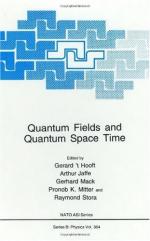|
This section contains 3,621 words (approx. 13 pages at 300 words per page) |

|
Classical physics is the research tradition beginning with Isaac Newton's Mathematical Principles of Natural Philosophy (often called simply the Principia) of 1687, which was overtaken by relativity theory and quantum mechanics in the early twentieth century and is still undergoing lively development in such areas as chaos and catastrophe theory. The "Newtonian" physics canonized in textbooks includes many elements added long after Newton, such as vector notation, the analytical mechanics that Joseph-Louis Lagrange and William Hamilton developed in the late eighteenth and early nineteenth centuries, and the laws of energy conservation and of electromagnetic phenomena formulated in the mid-nineteenth century. Indeed, Leonhard Euler in 1749 was the first to express Newton's second law as the familiar relation between a body's instantaneous acceleration and the momentary force that the body experiences; Newton's own version of the law set the body's change in momentum during a...
|
This section contains 3,621 words (approx. 13 pages at 300 words per page) |

|


